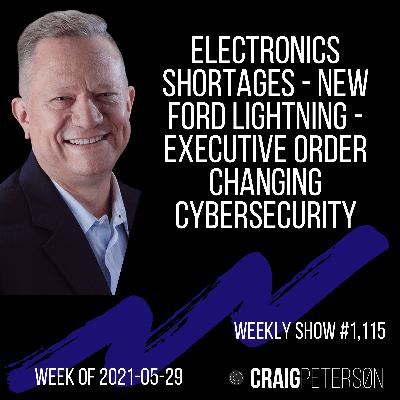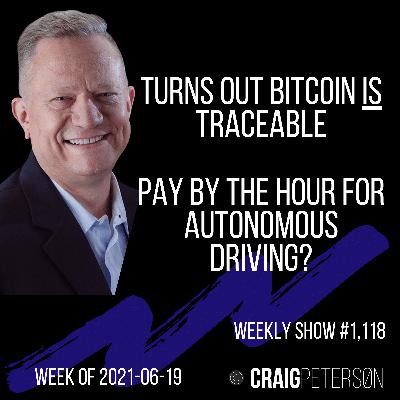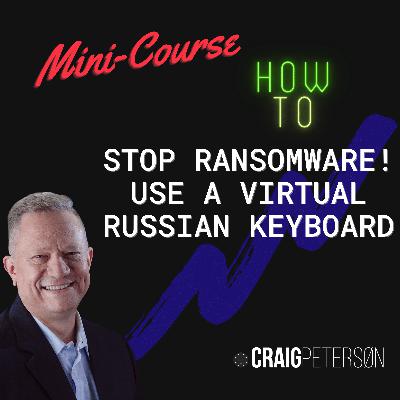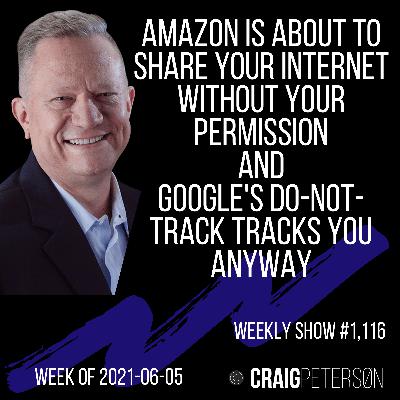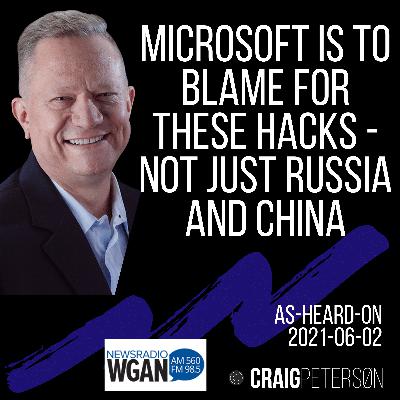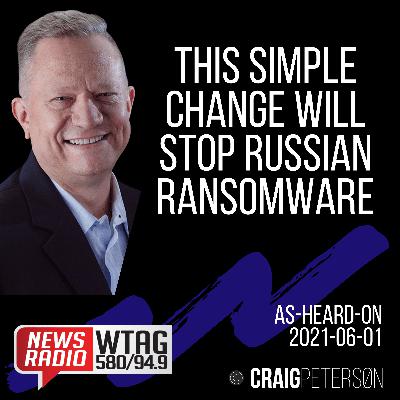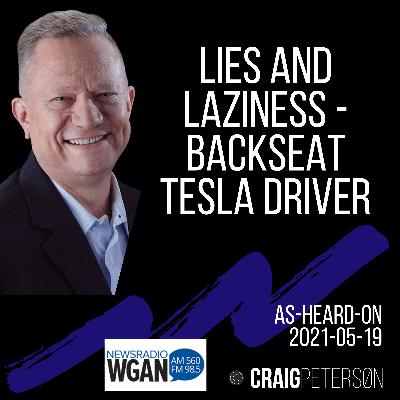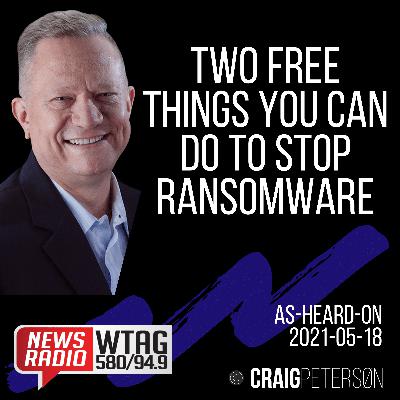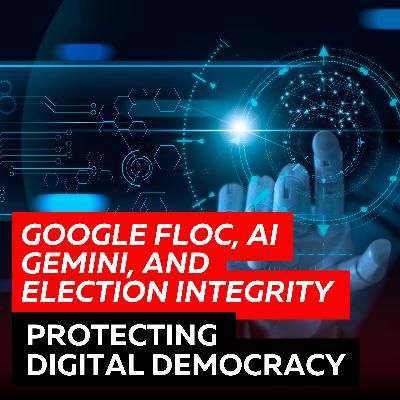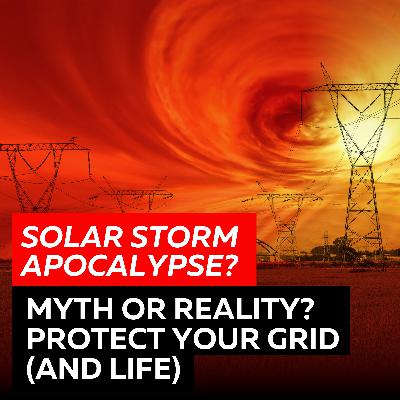Electronics Shortages - New Ford Lightning - Executive Order Changing Cybersecurity
Description
[Following is an automated transcript of Week 1115 podcast aired 2021-05-29]
Craig Peterson: [00:00:00 ] We've got these semiconductor shortages. What that means is various types of chips are just not available and it's been hurting us all the way across our economy. And that's where we're going to start the day with today. Semiconductors.
[00:00:15 ] Man, this has been so bad, these semiconductor shortages, because what it means is we just cannot get the types of devices that we want because those raw components just aren't available. I was talking with a gentleman earlier this week and he was telling me how he has a special little app that tells him when there is a Sony PS five available for sale anywhere online.
[00:00:45 ] It's gotten that bad. First of all, Why does he want a PS five so bad? I've never owned one or an X-Box or any of those gaming consoles? Since the original Nintendo, we had a we as well. Cause we had all the exercise stuff that went along with the week. But anyways, that's a different story entirely.
[00:01:04 ] I'm sure a lot of you guys play a lot of video games, but. There really are not Sony available. And we're finding much the same problem in even the car industry where some of these major manufacturers here in the U S have had to shut down lines. They've had, gone from three shifts down to a single shift every day.
[00:01:30 ] And in some cases it's gotten even worse where vehicle manufacturers are only. Making vehicles of few times a week. It is incredible. What's been happening and there a number of reasons for it. This isn't just one reason, but it does bring up the real problem we could have with our critical infrastructure.
[00:01:53 ] How critical is it that we have computers that can run our businesses, drive our cars, and fly our airplanes. I think it's pretty darn critical when you get right down to it. Yeah. You can probably get an extra year out of that computer, if you really need to many times that computer's just plain broken, you just can't use it.
[00:02:15 ] So you do need to replace it. But in reality, we've gotten a little bit soft. We are not making most of the chips here in the U S anymore. Yes, it's us technology. But most of this is in Southeast Asia, particularly in Taiwan. And do you remember what's happening with Taiwan with the threats from China?
[00:02:38 ] China is flying over Taiwan right now with military jets in Taiwanese air space, because China has never officially recognized that Taiwan is independent from the people's Republic of China. And do you know how socialists are? They're just going to go ahead and take that land. What would happen if they did.
[00:03:00 ] Remember China really wants to get their hands on our top chip technology because that helps them in the military. It helps them with all of these facial recognition systems they have in China, the social credit systems that they have in China, by the way, all built primarily by us companies and sold to China to track their people.
[00:03:23 ] Including the nasty things have been happening with the Wiggers over there. It's just absolutely incredible as well as Christian communities and others in China. So all of this tech has stuff they want to get their hands on. If they were to invade Taiwan, what would happen? The Biden administration.
[00:03:40 ] There they've been a little soft on this. Unlike president Trump, who said, yeah, the Trump administration, we're not going to tolerate any of this. And the Trump administration shipped all kinds of military systems to Taiwan, so they could potentially defend themselves because we don't really want to get drawn into a hot war, but.
[00:04:00 ] Oh, if they had taken over Taiwan, they would now have access to the U S technology on chip making. Now let me explain what that means from a technology standpoint, the chips that we have are. into a wafer of silicone. I'm going to try and keep this pretty simple. And then, and that silicone is grown. Cause you think of a crystal or maybe think of a still-life tight or it's like titers to leg might that you'd find in a cave.
[00:04:34 ] Those crystals are grown. They're humanly grown, and obviously you don't want any defects in them. So it's very hard to do to grow them. And we need those crystals for all kinds of things, including these solar panels that some people are so hot to trot about. I, Hey, I love the idea. Don't get me wrong.
[00:04:52 ] It's just right now, again, with solar panels, like so many other things, don't think you're green because you. Are or putting up solar panels. You're not right. There's certainly other advantages to it, but you're not being green by doing that. But what really matters is how much power does that chip use in order to do a certain number of computations?
[00:05:17 ] And how much heat is given off by the chip. Think again about the old Edison light bulbs that we've had and still have in some places and those Edison light bulbs, by the way, one of the original ones still burning in New York city and the fire department after over a hundred years, that one light bulb just incredible.
[00:05:37 ] But think about that Edison light bulb, it gives off light. Sure. But it also gives off heat. And the same thing is true with. Anything electronic the movement of the electricity through that conductor or semiconductor create heat. Heat is a waste. That's part of the problem with Edison bulbs. It'd be one thing if they were giving off just straight light, the, but so much of that energy is used to generate heat that we don't want.
[00:06:06 ] And then we have to dissipate that heat somehow, but that's another story. The same thing is true. When we're talking about these chips, the chips have a resistance to them. In fact, that's what a semiconductor does. It provide some resistance, so that resistance is going to. Do what create heat. So you feel your laptop when you're running it and so hot to get over time, the laptops have gotten faster and have actually created less heat, certainly poorer computational unit.
[00:06:44 ] They created a lot less heat. What we're looking at now is if we can make these chips even smaller. We can decrease the amount of electricity they need, because it doesn't have electricity. It doesn't have to flow as far through the conductors or semiconductors inside these chips. So that's what the race has been over the years.
[00:07:09 ] The race has been how small can we make them? And by making them smaller, You're doing a couple of things. You're making them faster because electricity has to travel less distance. Even though electricity is really fast. When you're talking about a billion transistors inside one of these chips or more, you are traveling through a whole lot of conductor and semiconductor.
[00:07:32 ] So you can make that chip faster by making it smaller and you can reduce the amount of power it needs, because you're not going to be giving off as much power via heat and heat generation. And that's important for everything, but particularly important for our mobile devices. Look at your apple watch or your iPhone or your laptop or your desktop.
[00:07:56 ] All of them need to consume less and less electricity as time goes on. So what we're talking about now are just teeny tiny measurement. We're talking about nanometers. So if you go online, you look up nano meter. Which is a foul. Yeah, there you go. 10 to the negative nine meters. It's a billionth of a meter.
[00:08:21 ] Isn't that something looking it up right now, sell it a 1E-9.000000000. Give or take, and it's a unit of measurement that is being used now in chips and chip designs. And we're seeing these faster and faster chips getting down into the five nanometer process that is incredibly small, incredibly.
[00:08:49 ] Fast potentially, but likely incredibly fast and uses a lot less electricity right now. We're seeing seven nanometers out of Taiwan and we're working on five nanometer, but we have such a shortage of chips right now that they're bringing some of these old 15 nanometer. Chip fabs online, even 22 nanometer.
[00:09:14 ] I'm looking right now online at some of these old chip fabricators that are being brought online and China really wants to get their hands on some of this technology, because at this point anyways, they really can't get to the seven nanoliter chips. China right now. I think is pretty much limited to 14 nanometer.
[00:09:39 ] So we're still, I had in that race, but because they're being made in Taiwan, these chips that we're using here in the us using us technology, and because we had the lockdown in Taiwan and pretty much worldwide, the whole supply chain got interrupted and these big car manufacturers just. Shut off the orders.
[00:10:01 ] So there's no reason for the manufacturers to continue to make these things are a little reason for them to make them for the car industry in the current street, he thought we can just turn it back on and we'll have the chips. And of course they didn't, but it's also been compounded by the conditions in Taiwan right now.
[00:10:19 ] Because the Taiwanese centers for disease control this week raised it's epidemic warning level and is strengthening their containment measures and making things even worse. Taiwan is in the midst of a severe drought. So they are. Rationing water in Taiwan. They're looking at cutoffs of two days a week.
[00:10:42 ] And water reduction plans are expected to decrease supply to all major manufacturers by as much as 15%. So there you go. In a nutshell, that's why we care. Nanometers and we're talking about chips. That's why we need to start making them back here in the U S. And the good news, apple and others are doing exactly that.
[00:11:03 ] Starting to bring some of this t

